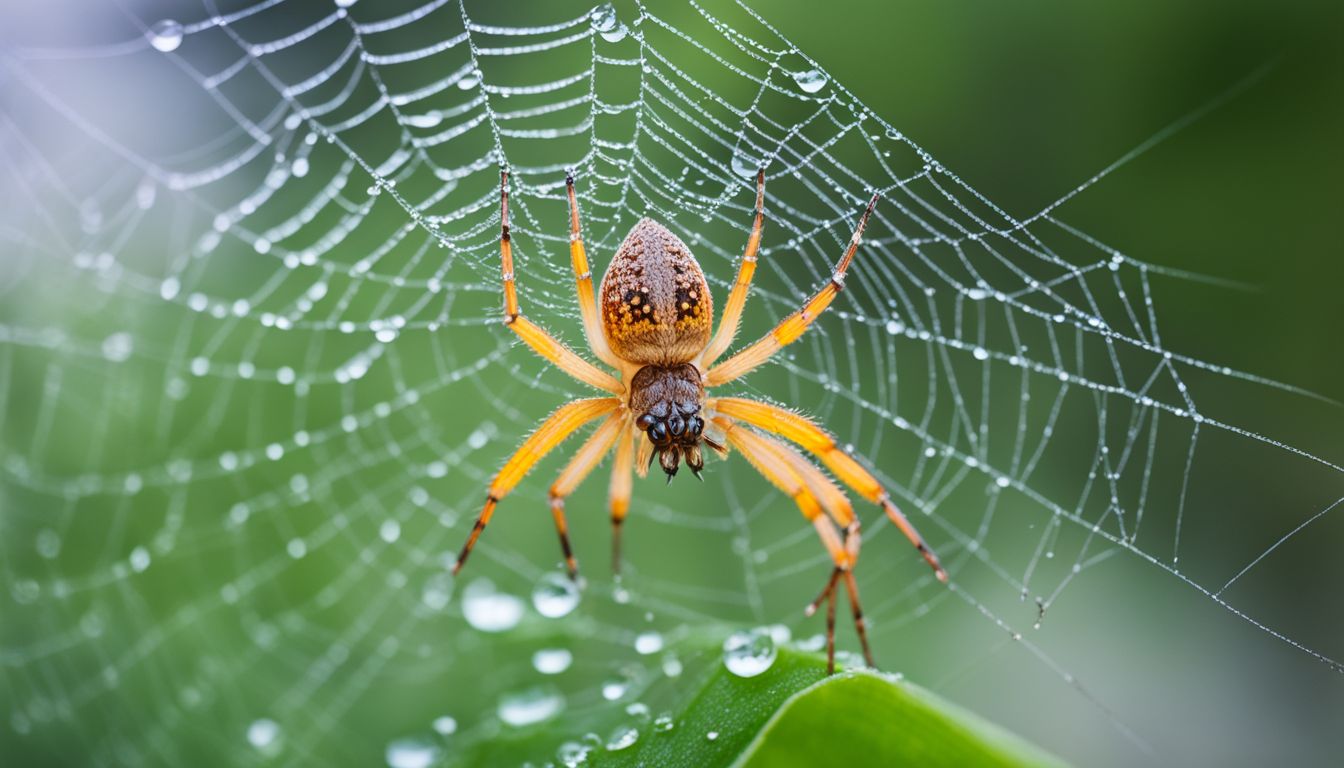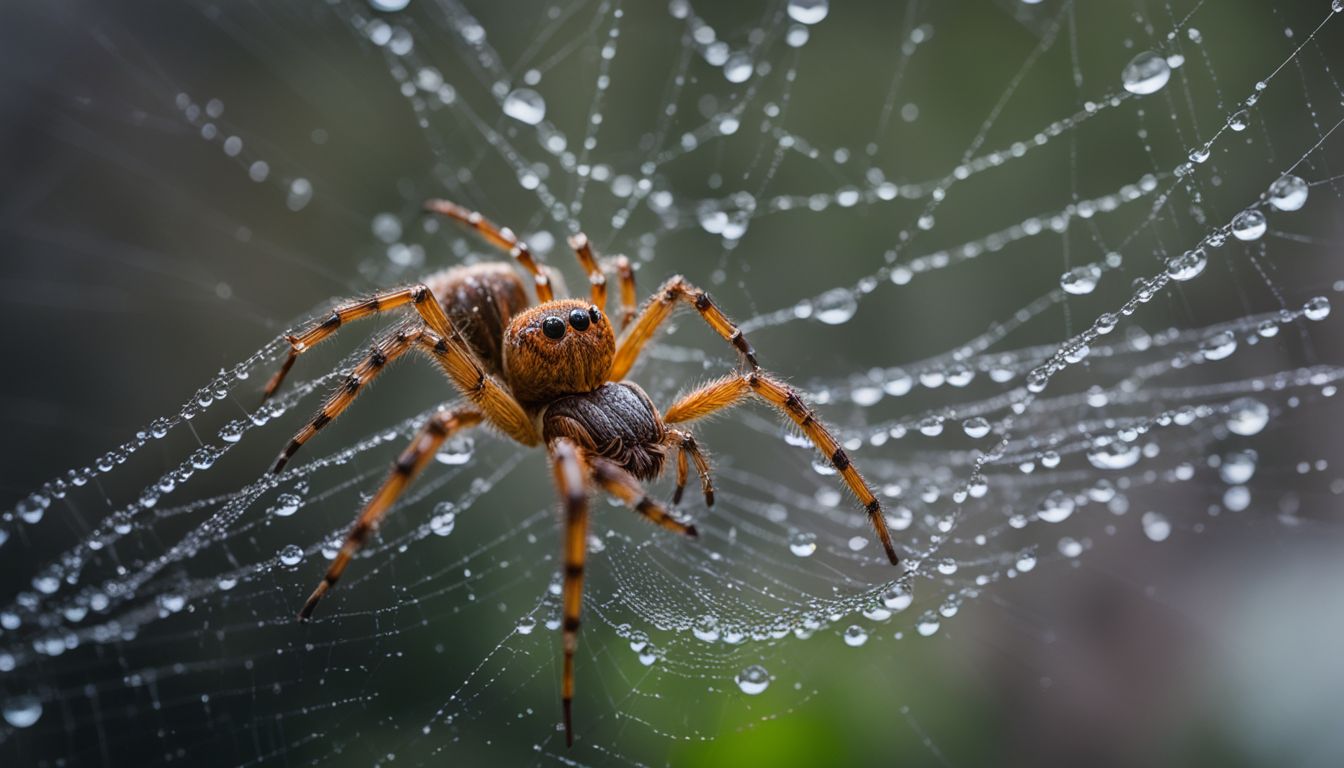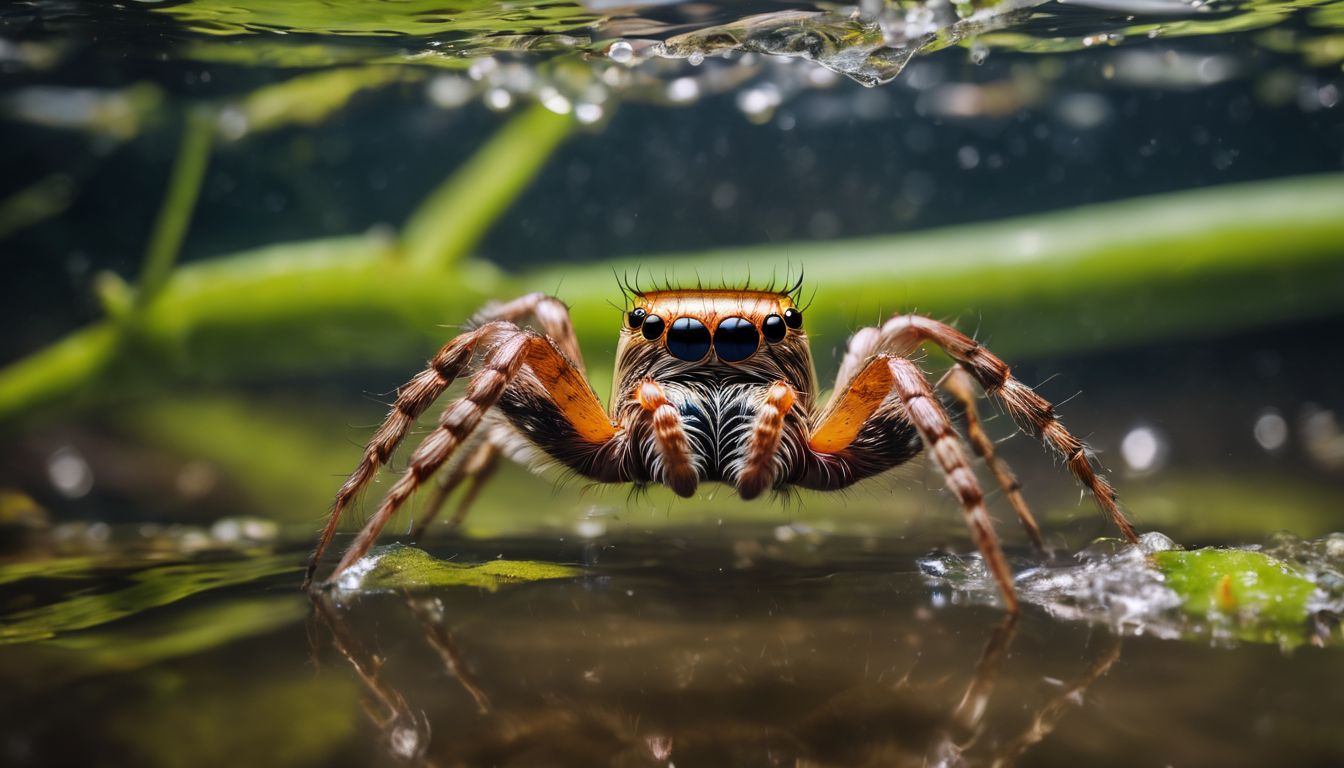Have you ever seen a spider struggle in water and wondered if it can drown? Though spiders are land animals, some can actually manage to survive short periods underwater. This article will uncover the truth about these eight-legged creatures‘ ability to handle being submerged.
Keep reading – it’s fascinating!
Key Takeaways
- Spiders can drown in water, but some species have adaptations that allow them to survive short periods underwater. They trap air bubbles for breathing or repel water with their body hair.
- Factors affecting spider survival in water include the species’ ability to hold breath, environmental conditions like temperature and oxygen levels, encounters with predators or prey near water bodies, exposure duration, and physical trauma from fast-flowing currents.
- Flushing spiders down toilets leads to drowning as they cannot pass the U – bend in pipes; they do not survive in plumbing systems. Understanding spider physiology and behaviors helps dispel myths and improve coexistence with these fascinating creatures.
Understanding Spider Physiology and Water

Spiders have a unique respiratory system that allows them to survive in various environments, including water. They interact with water using different strategies and adaptations.
Spider respiratory systems
Spiders have a unique way of breathing that uses both lungs and tracheae. They possess special parts called book lungs and trachea to take in air. These body parts let spiders get the oxygen they need from the air around them, which is vital for their survival.
The hairs on their bodies are not just for show; they can hold tiny bubbles of air close to the spider’s skin. This thin layer of trapped air can help some spiders breathe even when they are underwater because it allows for a small amount of oxygen exchange.
So, while many creatures have either lungs or gills, spiders use an interesting mix to breathe, making them quite different from other animals like fish with fins or turtles that swim in ponds.
How spiders interact with water
Some spiders can actually live on water. Thanks to the force called surface tension, they walk on top of it as if they were on land. This is how dock spiders or fishing spiders catch their meals – they sense tiny ripples made by prey and race across the water to grab them.
Other types, like diving bell spiders, go underwater with air bubbles stuck to their hairs. They use these bubbles to breathe while hunting aquatic insects.
Diving bell spiders even make underwater webs that look like shiny balloons – their own diving bells where they store air for breathing and resting. They go back and forth between these safe spots and the water around them.
Now imagine how this fascinating behavior shows us that not all spiders fear water; some are true swimmers and divers! Next up, let’s look into what happens when a spider ends up in more water than it likes.
The Reality of Spiders and Drowning

Can spiders drown in water, and what factors affect their survival? Let’s dive into the truth about spiders and their interactions with water.
Can spiders drown in water?
Spiders have lungs that are not made for water. If they stay under water too long, they will drown. Most must keep their book lungs dry to live. But some spiders can hold their breath for hours.
A wolf spider, for example, might last up to 40 hours underwater before it drowns.
These creatures often try to avoid getting wet. Still, sometimes they fall into sinks or showers and struggle to get out because of the slippery sides. Spiders trapped in water without an escape can end up drowning just like any other small animal.
Now let’s look at how spiders use their senses to survive around water.
Factors affecting spider survival in water
After understanding that spiders can drown in water, it’s important to consider the factors that affect their survival in water. Here are some important factors:
- Spider species: Some spider species have adaptations that allow them to survive longer underwater compared to others, such as the ability to trap air bubbles for breathing.
- Environmental conditions: The temperature and oxygen levels of the water can greatly impact a spider’s ability to survive underwater.
- Predators and prey: Predatory encounters or searching for food near water bodies can increase a spider’s risk of ending up in the water.
- Water exposure duration: The length of time a spider spends submerged in water directly affects its chances of survival, as prolonged exposure can lead to drowning.
- Physical trauma: The force and movement of the water, especially turbulent or fast-flowing currents, can cause physical harm to spiders, making it difficult for them to survive.
Exploring Spider Senses and Their Role in Water Survival
Spiders don’t have a specific sense to locate water, but they can detect its presence. When submerged in water, their ability to breathe air becomes restricted, leading to drowning if underwater for too long.
Spiders use tiny hairs on their bodies to sense changes in air pressure and detect vibrations around them. These sensory adaptations help them survive and escape before being completely submerged.
Now let’s uncover the myth surrounding spiders and toilets – “The Myth of Flushing Spiders Down Toilets”.
The Myth of Flushing Spiders Down Toilets
Many people believe that flushing spiders down toilets leads to their demise, but the truth is that they can survive in plumbing. We’ll explore the reality of spiders and U-bends to debunk this common myth.
Do spiders survive in plumbing?
Spiders do not survive in plumbing. They cannot come up through the toilet or drain, as there are blocks in the plumbing system to keep insects and pests out. Also, if flushed down the toilet, spiders will drown as they cannot get past the U-bend in the pipes.
While some spiders can survive underwater for more than a day, if they end up submerged in the sewer, they will ultimately drown.
The truth about spiders and the U-bend
When spiders end up in the bath, they can’t go back up through the drain because of the U-bend. But if you flush them down, they can drown. So, it’s not true that spiders survive in plumbing systems.
When a spider gets stuck underwater in pipes or sewers, it can quickly drown due to how they breathe and their inability to escape.
Now let’s explore how spiders use their survival strategies when dealing with water and submersion.
Spider Survival Strategies
Spiders have developed unique survival strategies to thrive in water, including trapping air bubbles for breathing and having water-repellent body hair to stay afloat. Understanding these adaptations sheds light on the fascinating world of arachnid physiology.
Air bubble utilization
Spiders can utilize air bubbles to survive underwater. Some spiders trap air in the hairs on their abdomen and use it as a source of oxygen. The diving bell spider is an example that creates a dome-shaped web to live underwater, using air bubbles for oxygen.
Certain aquatic spider species spend their entire lives underwater by creating air bubbles using silk threads for oxygen.
Water-repellent body hair
Spiders have hair on their bodies that repels water, just like a raincoat. This special hair traps air bubbles, helping spiders to stay above water and breathe even when submerged.
The trapped air forms a protective bubble around the spider, acting like a scuba tank for them to survive underwater. This remarkable adaptation allows spiders to navigate wet environments and escape drowning, showing how they’ve cleverly evolved to thrive in various conditions.
The water-repellent body hair of spiders effectively acts as a life-saving buoyancy aid. As they move through aquatic environments, these tiny air bubbles enable them not only to float but also respire in water without any harm.
Conclusion
In conclusion, whether spiders drown depends on the species and circumstances. Some can survive in water using air bubbles, while others cannot. Flushing spiders down toilets leads to drowning, which can take over an hour.
Understanding spider physiology and behaviors in water helps dispel myths and improve our coexistence with these fascinating creatures.
To learn more about the fascinating capabilities of our eight-legged friends, check out our feature on spider senses.
FAQs
1. Can spiders drown in water?
Yes, most spiders can drown if they stay under water for too long because they need air to breathe.
2. Are there any spiders that can live in water?
Yes, diving spiders and water spiders can live underwater because they take a bubble of air with them when they dive which helps them with gaseous exchange.
3. What happens if a spider falls into hot water?
If a spider falls into hot water, it will get hurt and could die quickly because the heat harms its body.
4. Do all spiders die instantly in boiling water?
Most likely yes, as boiling water is very hot and would kill a spider very fast by damaging their body systems.




